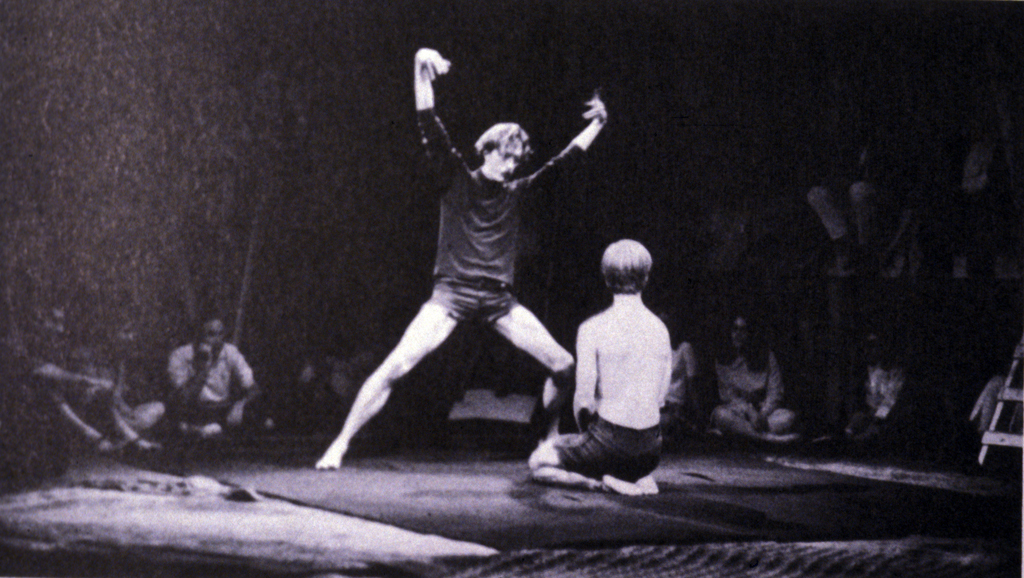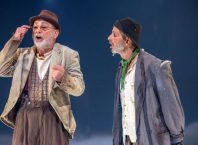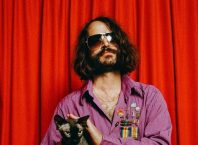
“We all perform,” said Dr. Atay Citron, as we discussed the forthcoming conference “Richard Schechner and Performance Studies” which will take place from December 19 – 23 at the University of Haifa. The international conference of scholars and artists will include lectures, panels, performances and video screenings of Schechner’s productions, and was initiated and organized by Citron in honor of his former teacher on the occasion of Schechner’s 76th birthday. All lectures are free and open to the public, but space is limited, and advance registration required, email: rsps.conference@gmail.com.
“Historically,” Citron recalled during our conversation, “I was there at the crossroads as a [first year] graduate student at NYU. After one semester we were told that Graduate Drama from now on would be Performance Studies…what the hell is performance studies? This was a shock for us.” Yet after a couple of semesters, Citron was asked by Richard Schechner to serve as his teaching assistant, and, as he says, “I became so immersed, it changed my life.”
What the hell is performance studies? Citron took time off from the last minute logistics of organizing such a large-scale conference, to provide Midnight East with a brief introduction/demonstration, beginning by taking Schechner’s book, Performance Studies (Routledge 2002), from his well-stocked personal library.
“Well, I won’t make you read the whole book now,” said Citron, “Performance Studies is an interdisciplinary approach to the investigation of a specific mode of human behavior, which Richard Schechner calls performative behavior or restored behavior or even simpler – behavior twice behaved. Which means: that we’re interested in first of all in the motivation for this kind of behavior, and secondly, in every detail of this particular kind of behavior. It turns out that we all take part in it; we all perform in everyday life as Erving Goffman tells us in his book – The Presentation of Self in Everyday Life (1959).
“Not only us, but also animals of all kinds, from insects to mammals. It is noticeable that bees dance before they copulate, and masculine struggles over territory is always ritualized it’s never a life to death fight. The Alpha male does not kill his opponent or challenger. There are certain points where they both know, and the community knows -and I intentionally use the word community here – that the battle has been decided and you don’t have to take life for that. We watch mammals and we see gorillas using drums not only their chests, and chimpanzees as well. We watch animals and we see that biology is one thing and society another thing and in order to exist together, animals as well as humans, need to signify. We need to tell ourselves that our actions carry meaning with them and the study is that the meaning is transmitted thru symbols and this is basically what we call performative behavior or performance.”
“The scope is enormous and that is why it needs to be an interdisciplinary approach because you need Ethologists, people who study animal behavior in its own habitat you need Anthropologists which is the same only for humans, and you need other social scientists, psychologists, sociologists and so on, oftentimes there is very interesting input from religious studies.”
As an example of the interdisciplinary nature of the field, and therefore, the conference, Citron mentions a talk that will take place in the morning session on Monday, December 20, “The Mirror Game: a Natural Science Study of Performance” presented by Lior Noy and Uri Alon. Citron describes them as “two scientists from the Weizmann Institute, who come from the Natural Sciences, who investigate creativity – what happens in the brain and different systems of the body in creative processes.”
In addition to an impressive list of lectures presented by scholars from diverse disciplines in major universities throughout the world, the conference will also include field trips (additional fee and advance registration)for conference participants (registration information on the conference site: http://rsps.haifa.ac.il/registration.html). On Friday, December 24, 2010, Debby Hershman, Curator of Prehistoric Cultures will conduct a tour of the restricted storerooms of the Israel Museum, “Roots of Ritual.” This will be followed by a tour of the Old City of Jerusalem, then, a Hassidic Tish (from the Yiddish word tish which means table, a gathering at the table of the Rebbe, that may include discourse on Torah, and singing Hassidic melodies and hymns) in the Me’ah Shearim neighborhood, and Midnight Mass in different Jerusalem churches. “So you have everything,” says Citron, “everything is performance – the Tish as well as the Mass, as well as the museum tour.”
“You have performance in political life,” he continues, “and we’re very much aware of it since the Kennedy – Nixon debate on television. The entire world knows that it’s important not only what ideology you represent or practice but how you present it and how charming you are and if the camera likes you or not. We have a session about state rituals (afternoon session, Thursday, December 23, 2010) in Belgium and Japan and a paper I look forward to hearing by Annabelle Winograd who has been researching WWI front line theatre by soldiers, mainly in drag, with a lot of gender reversal. She comes from the theatre but offers discourse open to so many other disciplines, it’s fascinating.”
Going back to the pioneering days of Performance Studies, Citron said, “The initiative to start this by Richard Schechner came from a certain kind of sensibility, a typical avant-garde sensibility, meaning, as I teach it to my students, the first impulse is disgust of what surrounds you. Without it you can’t be an avant-gardist. You hate with a passion everything around you: if you’re a painter then you hate everything in the art world around you, if you’re a theatre person you hate the Cameri, Beit Lessin, HaBima, I still do. As Peter Brook said – the dead theatre, theatre that exists on a formula with an audience that is dead – I mean, is not focused on the show at all, but on what happens after – the coffee…whatever.”
“So there are two impulses: passion against, and the second which has to complement it, is a yearning to a utopian theatre oftentimes something from the past that you want to restore, like Nietzsche for example, at the end of the 19th C said it’s ancient Greek theatre – birth of tragedy. Now, what did Nietzsche know about ancient Greek tragedy? Mainly speculation, but it didn’t matter because his book The Birth of Tragedy is still very useful to us. Even his speculation creates such a strong platform for something than can be created now, that would unite people that would create a certain symbiosis of what he calls the Dionysian and the Apollonian the two complementary opposites. Or Artaud, our prophet, the prophet of the visual theatre, what did he know about Balinese theatre? He wrote a beautiful essay about it, he saw fragments of it in the colonial exhibition in Paris. It would not pass as a Masters thesis anywhere, but he was not a scholar, he was a visionary. So this little thing that triggered the essay and later the whole vision of the theatre of cruelty is more important than the fact. It’s a vision, its triggered by something.”
“Performance Studies, I believe, is a vision triggered by the same mechanism as avant-garde,” says Citron, “and personified by Richard Schechner, historically or biographically, it’s the same thing because Richard Schechner was from the start both an academic and active theatre person.”
“I think the starting point historically is his famous, or infamous, depending on how you look at it production of Dionysus 69 which his own adaptation with a company of Euripides’ The Bacchae. We’re going to show it on video [there will be continuous video screenings of Schechner’s productions at the conference]. There’s a beautiful film you know who made it? Brian de Palma (1970) and it’s a beautiful film because it’s split screen, throughout the film you see 2 angles at the same time. The fact that he is also a theoretician is very significant because everything he did in Dionysus 69 is documented in two books. One an album, the second more theoretical, is Environmental Theatre (Dutton 1973).”
“He was not the first, but he was among the pioneers who started working in alternative spaces, performing in a garage in Soho. Soho was very different from what we know today. It was an industrial area, one street before you get to china town. This place is on the corner of Wooster and Grand. It was small factory he decided to call it The Garage, and he decided also not to change it or remodel it as a theatre. Even people today when they do performances in a hangar they make it look, they adapt it into a theatre – he didn’t, which is more daring. Instead he built scaffolding for the audience all around. It was environmental theatre, but environmental theatre did not exist, he made it up.”
“In environmental theater actors mix with audience and the result is always audience participation and Richard Schechner is a wizard of audience participation. It’s never forced; it’s always light and humorous. You don’t need to participate, but you are encouraged to participate and usually the incentive is very sophisticated. I mean there’s a lot of thought invested in how we make people into an ad hoc community a participatory crowd.”
“He was a pioneer of nudity, and his company was often harasses and arrested for that…not only nudity but the whole erotic context derived from original Bacchae but not necessarily translated into previous productions of the Bacchae. Not only erotic in nature but erotic and all inclusive, with audience participation it’s kind of an orgy not necessarily penetration but a very erotic experience – in 1968, the year of make love not war, in a garage in Soho, people come again and again.”
“The presence of ritual is of utmost importance in that production and from that Richard tried to understand ritual, the human need in ritual: why do people participate, why do people dance, and close their eyes and let other people touch them erotically and gain a spiritual experience as well as physical and erotic experience of being part of community. And from there it’s not a big leap to the encounter that Richard had with Victor Turner the famous anthropologist who talks about the human need for communitas. How does he define communitas? The feeling of oneness, of many individuals stripped of their well… clothes is one thing, status symbols, social status so that you experience Martin Buber’s I And Thou in a large sense.”
According to Citron, Performance Studies has “never developed as a field of research” in Israel. Dorit Yerushalmi, Chair of the Theatre Department at the University of Haifa, an historian of Israeli Theatre will present her analysis in the noon session on Monday, December 20, 2010. Citron returned to Israel in 1984, still owing Schechner a term paper and finishing up his thesis. He was teaching a course on Performance Studies at Tel Aviv University at the time, and had asked his students to create a performance, their endeavors providing him with much food for thought. “The variety was so huge,” Citron recalls, citing projects on the Mimuna, video game arcades, the operating theatre in a hospital, football fans and motorcyclists who met every Tuesday at the London Ministores on Ibn Gvirol Street in Tel Aviv to “make enormous noise,” but “one of the best, was on the Mikveh, a beautiful, amazing performance inventing a new ritual” that was performed in the University Art Gallery…We realized that if you want to study performance in Israel there’s a lot of material…It’s a pity that very few people do that – actually only one person, that’s me.”
“Richard is close to my heart,” says Citron, “it’s not that we never had arguments – we had, a lot, even fights. I told him when I left, in Hebrew the word for teacher is “moreh” [a word which means literally “guide” or one who shows the way] and its like this, you show the direction, you point out where it is, and for me this is the most important.”
Richard Schechner and Performance Studies
An International Conference of Scholars and Artists Honoring Richard Schechner on his 76th Birthday – December 19-23, 2010 at the University of Haifa
A collaborative effort of Theatre Departments in three Israeli universities: the Hebrew University in Jerusalem, Tel Aviv University, and the University of Haifa, which initiated the project. Additional partners are New York University, where Schechner is University Professor, and TDR: The Drama Review, Tisch School of the Arts/ NYU.
Steering Committee:
Amal & Nissar Allana, New Delhi, India; Eugenio Barba, Odin Theatre, Denmark; Barbara Kirshenblatt-Gimblett, New York University, the U.S.; Carol Martin, New York University, the U.S.; Atay Citron, Haifa University, Israel; Milla Riggio, Trinity College, the U.S.; William Sun, the Shanghai Theatre Academy, China; Yuichiro Takahashi, Dokkyo University, Japan
Academic Committee:
Prof. Freddie Rokem and Prof. Nurit Yaari, the Department of Theatre Arts, Tel Aviv University, Israel; Prof. Jeanette R. Malkin, the Department of Theatre Studies, Hebrew University, Israel; Dr. Atay Citron, the Department of Theatre, Haifa University; Prof. Carol Martin, the Department of Drama, Tisch School of the Arts, New York University
Organizing Committee:
Dr. Dror Harari, the Department of Theatre Arts, Tel Aviv University; Dr. Olga Levitan, the Department of Theatre Studies, Hebrew University; Dr. Atay Citron, the Department of Theatre, Haifa University; Dr. Sharon Aronson-Lehavi, the Department of Comparative Literature, Bar-Ilan University; Dr. Sarit Cofman-Simhon, the School of Performing Arts, Kibbutzim College; Prof. Carol Martin, the Department of Drama, Tisch School of the Arts, New York University; Adva Weinstein, Organizing Assistant.
AYELET DEKEL






Gaby – you were there! That is way cool, I’m a little jealous…thank you for sharing the experience with us!
I was there, at the bacchai performance in the garage in Nyu. It was wild. the battle between Dyonisos and the king Penteus refusing to celebrate the myth of Dionisos, spread into the audience- which was ready to rejoyce and love and not regqrding those who were sort of puritan and keeping to themwelselvews… it was very physical- and being a young israeli actress it was confusing to become all of a suddnen a perticipant, being embracd by strangers… so i hid behind the matresses on the floor and watched with amazment how the audience is doing it for the sake of the God… all of it was most impressive and unforgetable. years later Arie Sachs and myself did a different production at the kameri whihc became a public scandal. it was real theatre.
Comments are closed.